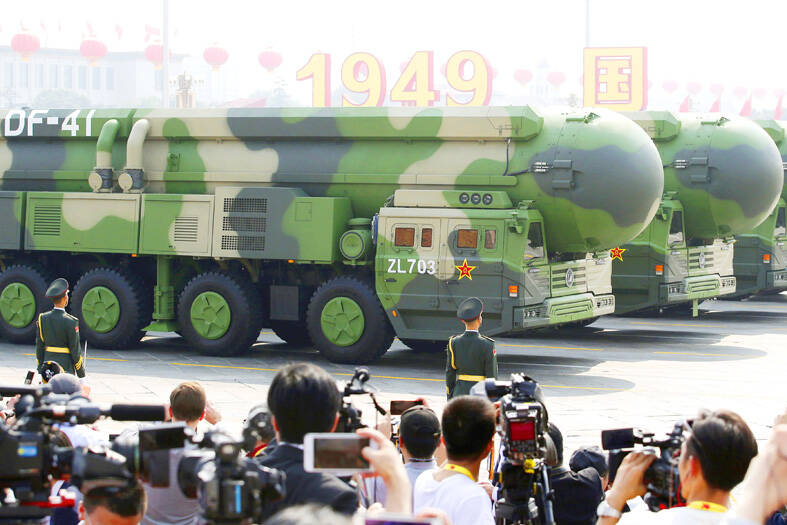China is on track to have 1,000 operational nuclear weapons by 2030 in a development likely to accelerate US nuclear arms modernization, a Taiwanese expert said in the Mainland Affairs Council’s (MAC) latest monthly report.
Beijing is strengthening the striking power of its nuclear triad in the form of the Chinese People’s Liberation Army (PLA) air force, navy and rocket force, Tung Hui-ming (董慧明), an associate professor of Chinese military studies at National Defense University, wrote in the report.
The PLA had 500 operationally available nuclear weapons as of May last year and is working to double that amount, he said.

Photo: Reuters
The DF-41 intercontinental ballistic missile, which can be launched from silos, road vehicles and railcars, is a flexible and dependable system that forms the backbone of the PLA’s deterrence capabilities, Tung said.
The design of the Type 094 nuclear-powered ballistic missile submarine showed Chinese scientists have made strides in reducing the noise and increasing the payload of submarines, enhancing the credibility of China’s sea-based deterrence, he said.
China is also developing the DF-51 intercontinental ballistic missile, Type 096 nuclear-powered ballistic missile submarine and Xian H-20 bombers, advanced weapons systems capable of serving as nuclear strike platforms, Tung said.
These systems represented significant breakthroughs in the effective range, stealth and penetration capabilities of Chinese weapons, as well as Beijing’s resolve to obtain more powerful nuclear arms, Tung said.
The US believes these efforts are enabling China to obtain more nuclear capabilities than the minimum quantity necessary to achieve deterrence, which would increase uncertainty in the regional balance of power, Tung said.
The increase in the PLA’s nuclear deterrence capabilities has substantially affected the global strategic equilibrium, spurring the US and its allies to take countermeasures, he said.
The US most likely would hasten nuclear arms modernization to strengthen its strategic deterrence while other regional powers make changes to their strategic posture to strengthen defensive alliances, he said.
The international community faces the challenge of striking a balance between achieving security and maintaining regional stability, he said.

Trips for more than 100,000 international and domestic air travelers could be disrupted as China launches a military exercise around Taiwan today, Taiwan’s Civil Aviation Administration (CAA) said yesterday. The exercise could affect nearly 900 flights scheduled to enter the Taipei Flight Information Region (FIR) during the exercise window, it added. A notice issued by the Chinese Civil Aviation Administration showed there would be seven temporary zones around the Taiwan Strait which would be used for live-fire exercises, lasting from 8am to 6pm today. All aircraft are prohibited from entering during exercise, it says. Taipei FIR has 14 international air routes and

Taiwan lacks effective and cost-efficient armaments to intercept rockets, making the planned “T-Dome” interception system necessary, two experts said on Tuesday. The concerns were raised after China’s military fired two waves of rockets during live-fire drills around Taiwan on Tuesday, part of two-day exercises code-named “Justice Mission 2025.” The first wave involved 17 rockets launched at 9am from Pingtan in China’s Fujian Province, according to Lieutenant General Hsieh Jih-sheng (謝日升) of the Office of the Deputy Chief of the General Staff for Intelligence at the Ministry of National Defense. Those rockets landed 70 nautical miles (129.6km) northeast of Keelung without flying over Taiwan,

The Ministry of National Defense (MND) today released images of the military tracking China’s People's Liberation Army (PLA) movements during the latest round of Chinese drills around Taiwan. The PLA began "Justice Mission 2025" drills today, carrying out live-fire drills, simulated strikes on land and maritime targets, and exercises to blockade the nation's main ports. The exercises are to continue tomorrow, with the PLA announcing sea and air space restrictions for five zones around Taiwan for 10 hours starting from 8:30am. The ministry today released images showing a Chinese J-16 fighter jet tracked by a F-16V Block 20 jet and the

City buses in Taipei and New Taipei City, as well as the Taipei MRT, would on Saturday begin accepting QR code payments from five electronic payment providers, the Taipei Department of Transportation said yesterday. The new option would allow passengers to use the “transportation QR code” feature from EasyWallet, iPass Money, iCash Pay, Jkopay or PXPay Plus. Passengers should open their preferred electronic payment app, select the “transportation code” — not the regular payment code — unlock it, and scan the code at ticket readers or gates, General Planning Division Director-General Liu Kuo-chu (劉國著) said. People should move through the